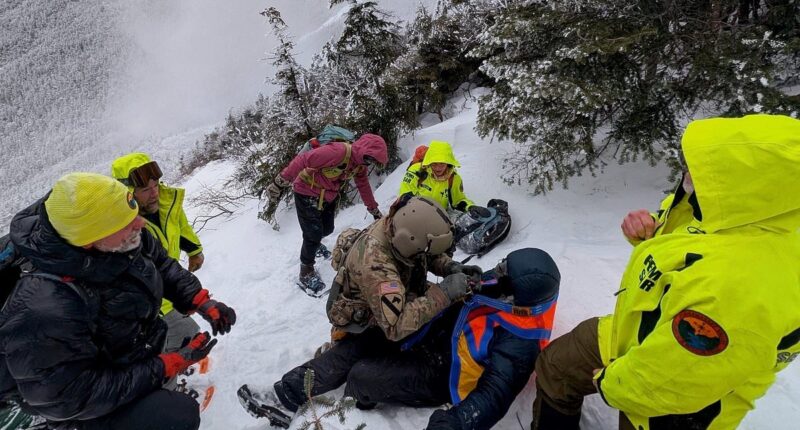
A hiker found himself in need of rescuing from the summit of a New Hampshire mountain due to severe winter weather conditions that left him severely hypothermic.
Patrick Bittman, 28, from Portland, Maine, had hoped to witness an unforgettable sunrise from the 5,249ft summit of Mount Lafayette.
Starting his solo hike on Wednesday night, he encountered intense wind and snow as he neared the peak of Little Haystack on Franconia Ridge at 4,760 ft.
The deep, blowing snow drifts forced him to abandon his attempt and turn back.
The descent, however, posed even greater dangers than expected as the hiker’s solitary journey turned into a fight for survival, pushing the limits of his endurance and the capabilities of rescue teams.
Blinded by the storm and disoriented in the biting cold, Bittman veered off course, plunging into the remote Dry Brook drainage.
Temperatures plummeted to 20 degrees Fahrenheit, with wind chills nearing zero.
His clothing and hiking gear were no match for the unrelenting elements.
As the hours ticked by and night fell, Bittman was slowly consumed by the cold.
By the time dawn broke on Thursday morning, Bittman was freezing, desperate and unable to move his limbs.
Summoning the last of his strength, he managed to call 911 for help – now having been buried in snow several feet deep.
The call sparked a massive rescue effort that would stretch across hours of grueling terrain and unrelenting weather.
Ground teams from the New Hampshire Fish and Game Department and Pemi Valley Search and Rescue Team mobilized, joined by an aerial crew from the Army National Guard.
But the mountain, cloaked in dense cloud cover and lashed by intermittent snow squalls, made their efforts particularly tricky.
It meant the helicopter was only able to get within a quarter of a mile of the hiker before they had to turn back because of poor visibility. The helicopter was able to land at nearby Cannon Mountain Ski Area to wait for a safer opportunity.
Visibility was near zero, and the rugged, snow-covered landscape offered no easy passage.
On the ground, rescuers fought through the thick vegetation, hacking their way through 1,000 feet of snow-drenched wilderness to reach Bittman.
By early Thursday afternoon, they found him – barely conscious, suffering from severe hypothermia, and unable to move.
Rescuers wrapped him in an emergency sleeping bag, dressed him in warm, dry clothes, and carefully administered hot fluids to stabilize him.
After two tense hours, a break in the weather allowed the Army National Guard helicopter to make its approach.
A medic was lowered into the icy abyss and assessed Bittman’s condition before hoisting him into the aircraft.
The dramatic aerial rescue was caught on camera and saw the man being lifted the out of the wilderness to be flown to a nearby hospital for treatment.
Officials praised the extraordinary teamwork that brought Bittman back from the brink.
‘This aerial rescue saved a multi-hour carryout through rugged terrain and is a testament to how search and rescue works in New Hampshire,’ said representatives from the New Hampshire Fish and Game Department.
‘Multiple groups came together with a common goal, and today, that goal saved a life.
‘Winter conditions have arrived in the White Mountains, and hikers are encouraged to be prepared for their trek to include packing the ten essential items: map, compass, warm clothing, extra food and water, headlamp, fire starter, first aid kit, whistle, rain/wind jackets and pants, and a knife,’ the New Hampshire Fish and Game said in a statement while urging other hikers to take care.

















